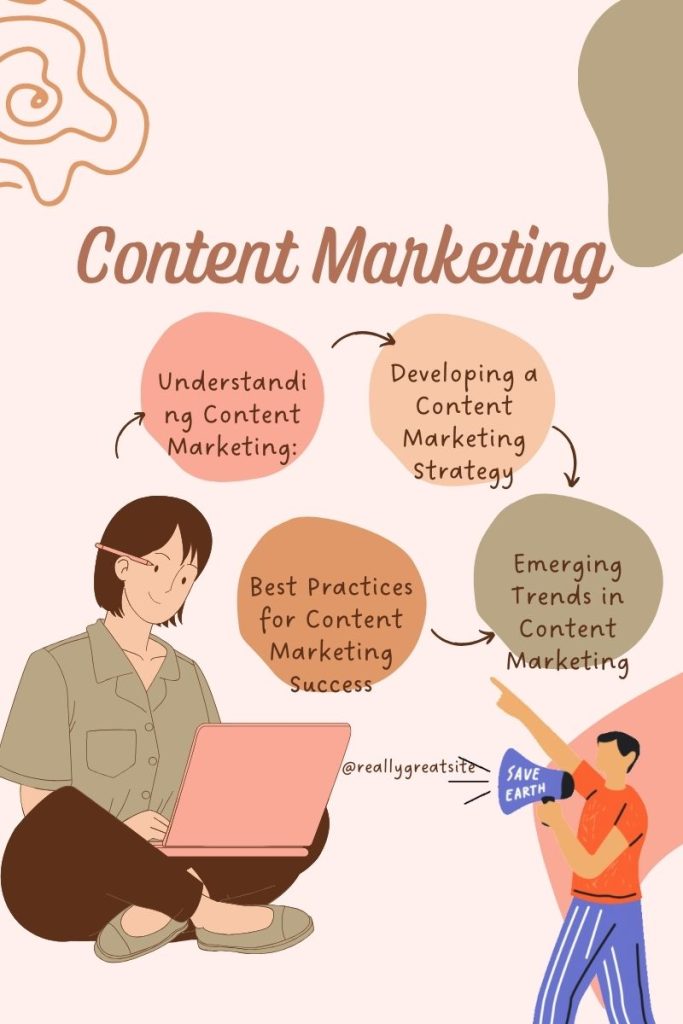One tactic has proven to be consistently successful in the constantly changing field of digital marketing: content marketing. Businesses have realized the importance of producing top-notch content to engage and draw in their target audience as customers increasingly turn to the internet for entertainment, information, and problem-solving.
We will go deeply into the realm of content marketing in this extensive book, covering its core ideas, successful tactics, new trends, and best practices. This guide will give you the information and understanding you need to properly leverage the power of content marketing, regardless of your level of experience as a marketer—whether you’re a novice trying to grasp the fundamentals or an experienced professional looking to improve your strategy.

I. Understanding Content Marketing:
1.1 What is Content Marketing?
Content marketing is a strategic marketing approach that focuses on creating and distributing valuable, relevant, and consistent material in order to attract and retain a carefully defined audience and ultimately induce profitable customer behavior. By providing educational, entertaining, or enlightening content, content marketers hope to enhance the consumer experience rather than interrupt it with commercial advertising. This is not like the conventional forms of advertising.
1.2 The Importance of Content Marketing:
In today’s digital economy, content marketing is essential for a number of reasons.
Establishes Thought Leadership: You can establish your brand as a reliable authority in your industry by regularly creating high-quality content on subjects related to it.
Builds Brand Awareness: By producing shareable, interesting material that appeals to your target market, you can use content marketing to raise the visibility of your brand and reach a wider audience.
Promotes Customer Engagement: Strong content makes people want to interact with it and builds deep connections with your audience, which increases consumer advocacy and brand loyalty.
Supports SEO Efforts: Since search engines give priority to new, pertinent information, content marketing is a crucial part of any all-encompassing SEO plan.
Produces Leads and Conversions: By offering insightful content that tackles the requirements and problems of
II. Developing a Marketing Strategy
2.1 Defining Your Objectives content marketing:
Setting specific goals for your content marketing endeavors is crucial before you start creating content. These goals, which could include building client connections, generating leads, boosting website traffic, and raising brand awareness, should be in line with your overall business objectives. cpa marketing.
2.2 Understanding Your Audience content marketing
Understand your audience’s demographics, preferences, and pain points to create appealing content. Conduct market research, analyze consumer data, and develop buyer personas to gain insights into their needs and preferences.
2.3 Content Planning and Ideation:
Once you have a clear understanding of your objectives and audience, it’s time to brainstorm content ideas that align with your goals and resonate with your target market. Consider the types of content that will best serve your audience’s needs, such as blog posts, videos, infographics, podcasts, or social media posts.
2.4 Content Creation and Distribution:
Now that you have your content ideas, it’s time to produce excellent, captivating content that benefits your audience. Make sure your material is thoroughly researched, aesthetically pleasing, and search engine optimized whether you’re creating blog entries, videos, or images.
Create a distribution plan as soon as your material is prepared to make sure it reaches your target audience efficiently. Content sharing on your website, blog, social media accounts, email newsletters, and other pertinent platforms could fall under this category.
III. Emerging Trends in Content Marketing:
3.1 Video Content:
Businesses increasingly utilize video content to engage customers and convey brand messages effectively. From short-form clips on social media to longer formats on platforms like YouTube, video remains a powerful tool for audience outreach.
3.2 Interactive Content:
Interactive content, such surveys, polls, quizzes, and interactive infographics, enables marketers to have a two-way dialogue with their audience and offer individualized experiences. Interactive content may increase brand connection and engagement by promoting participation and feedback.
3.3 User-Generated Content:
Utilizing user-generated content (UGC), like images, videos, testimonials, and reviews, promotes brand authenticity and trust. By encouraging happy customers to share their experiences, UGC also boosts brand promotion.
3.4 Voice Search Optimization:
Content optimization for voice search has gained importance due to the rising popularity of speech-activated smart devices such as Google Home and Amazon Echo. In order to respond to voice search questions with clarity and relevance and to accommodate natural language requests, brands need to modify their content strategies.
IV. Best Practices for Content Marketing Success:
4.1 Focus on Quality Over Quantity:
Put quality before quantity when creating material, as opposed to producing a never-ending supply of it. Even if it requires you to publish less regularly, put your attention toward producing material that is educational, engaging, and beneficial to your audience.
4.2 Consistency is Key:
In content marketing, consistency is crucial. To keep your audience interested and your business at the forefront of their minds, stick to a regular publishing schedule. Whether you publish on a daily, weekly, or monthly basis, maintaining consistency with your content can help you gain the audience’s confidence.
4.3 Measure and Analyze Performance:
Make data-driven decisions to refine your plan over time and use analytics tools to track the effectiveness of your content.
4.4 Adapt and Evolve:
Since the digital world is always changing, content marketers that are successful need to be flexible and quick to adjust. Stay ahead: Monitor trends, watch competitors. embrace innovation in your content strategies.
Conclusion:
“Content marketing remains a powerful tool for engaging audiences, driving results, and achieving long-term success in today’s digital landscape.”
Visit our website to know more about Social Media Marketing Topic






